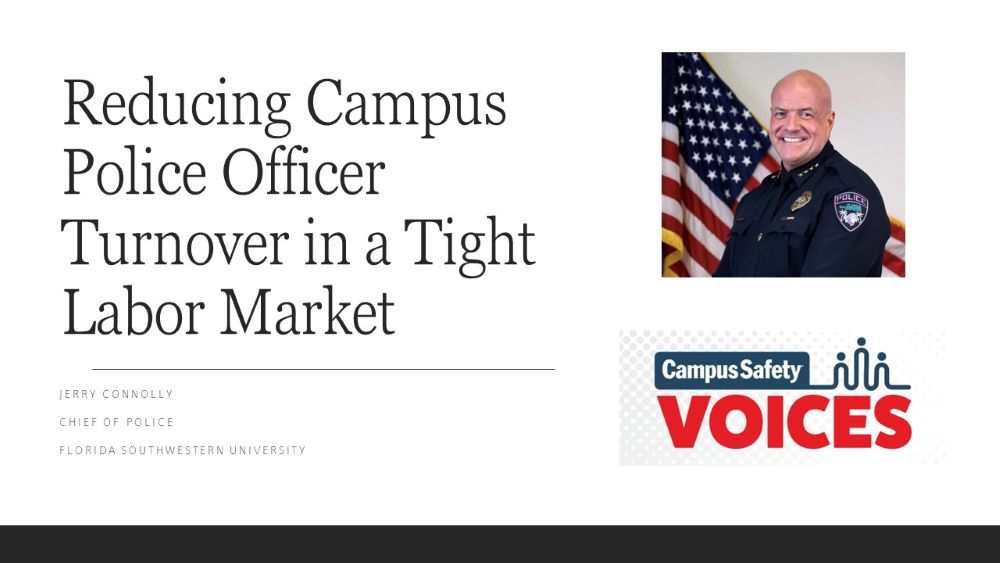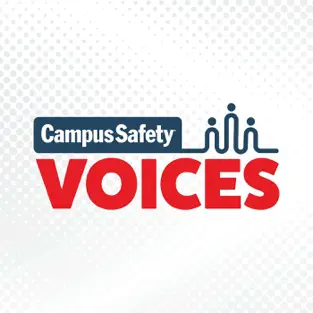Robin Hattersley: I'm pleased to introduce today's guest, Florida Southwestern State College Chief of Police, Jerry Connolly. He's also one of this year's campus Safety Higher Education Director of the Year finalists. Chief Connolly was able to significantly reduce turnover in his department, so I was curious to learn the steps he took to do this.
Chief, welcome to the show and congratulations on being named one of our campus safety director of the year finalists.
Jerry Connolly: I truly appreciate it and I'm honored to be nominated and it's a pleasure to be here with you today.
RH: Well, we appreciate you taking the time to talk with us. Before I get into the actual questions, can you briefly describe your department, number of sworn, non-sworn officers, number of employees overall, things like that?
JC: Sure. We are what we consider a smaller police department. We have 21 sworn that's including myself, law enforcement officers. We also have 15 support personnel who assist the officers with general tasks such as door access, safety escorts for individuals that require or ask for a safety escort. And they also do other projects for US safety related projects. And they also work closely with risk management in and facilities department looking for hazards and dangers on the property and report those quite quickly as well. And they also are our eyes and ears when the officers are not in specific areas, but they are and they have direct communication to officers.
Currently we are responsible for four campuses and four different jurisdictions. So we work closely with those county law enforcement agencies and four jurisdictions. And we are a unique campus in the state of Florida that have four different campuses in four different jurisdictions that we have to cover with law enforcement personnel and support personnel. So it's quite challenging to do that, but we have a lot of support from law enforcement agencies in those areas.
RH: So I know you recently joined Florida Southwestern. So what was the employee or officer turnover rate before you started with the campus and what's the turnover rate now?
JC: So when I started in 2019, the turnover rate for employee officer was greater than 20%. And since 2019 till 2024, more specifically over the past two years, our turnover rate has been reduced quite significantly to 2% to 5%.
RH: That's great. And so what were the reasons for the high turnover rate?
JC: So the previous police administration prior to my appointment, they fostered a less than desirable culture that consisted of no accountability, non-compliant personnel, a lack of modernized infrastructure with robust policies that properly govern the police department. And they didn't have any competitive incentives that was comparable to similar policing agencies.
RH: So how did you go about addressing these causes? And if you can go to detail, how did you increase officer pay, benefits, recognition, training, things like that?
JC: So upon my appointment, within about a year or so, give or take a few months, I authored over 150 policies that modernized the police departments infrastructure. We increased accountability, we delineated the officer employee responsibilities. We also produced fair and equitable practices throughout the police department. We distributed personnel workloads equally so everybody knows what their responsibilities are specifically that's pertaining to their job classification. We increased specialized training and leadership opportunities as well.
We also introduced succession planning as well. So employees know that they're just not stuck in the position they are. There is upward momentum through succession planning. We created a formal recognition and awards structure to properly reward and recognize our employees and officers for the good that they do for our community. And based on the creation of the modernized policies and practices, the culture changed dramatically. It fostered a positive climate, which increased the morale substantially.
Furthermore, I spearheaded a substantial increase in pay to be competitive with other similar agencies. And also during that timeframe I proposed and it was accepted to create a step paid program. So employees have the lens into what their pay will be in 10 years given all the agencies, college agencies and or universities in the state of Florida. We're one of two that have actually a step paid program in place outside of 28 colleges and 15 universities in the state of Florida. So that's quite accomplishment on our part to propose it and the college administration accepted it.
RH: So how long did all of this take? I mean, that's a lot of work.
JC: It was a culmination of pretty much my whole tenure here the past four years, maybe three, but for the most part in the past four years. In addition to that, we have been, throughout that whole timeframe, we've been preparing for accreditation and we just received a recommendation from the accreditation assessment team to the commission that we be accredited. So in June, I will be accepting our accreditation. And again, throughout everything that I've just said, we've been also taking care of what we needed to do to become accredited. So we are very proud of our achievement.
RH: Congratulations on your accreditation, almost accreditation next month. Well, any tips or tricks or advice you'd like to give your peers at other institutions on how to reduce turnover and how to address the challenges you were addressing?
JC: So my tips would be just take a global look at your agency and see where you can make improvements that's going to impact employees, but not necessarily cost a lot of money to the college. I know everybody has tight budgets all across the country, but it's what you do, the little things that you do that you can implement within an existing budget that will really help with the morale of your folks.
One of the biggest things that we did here at FSW is that we implemented a fleet take home program. We were the only college in the state of Florida to implement a fleet take home program for marked cars to be taken home with unlimited usage. So that is a big incentive for law enforcement officers because a lot of the areas in this region that we cover, a lot of police agencies don't offer take home car programs or limited take home car programs.
So ours is full take home car program for all of our officers. So that was a huge incentive for us and I did it all within the existing budget. I didn't have to ask for new capital expenditures, so that was just salient point I wanted to talk about.
But listen to your employees and they will tell you what they're looking for and obviously a lot of the stuff that they tell you is small things and it's within reason. And then you can capitalize on that by improving morale, by approving their ideas or implementing the things that they're talking about.
It's the little things to listen to your employees but also working collaboratively with your college administration as well, because as long as they know what's going on as well and the things that you're doing within the police department, they will always be supportive of what you're doing. And I think that's a good, both of those are a good open lines of communication for your employees and the college administration and just you're the person, the leadership within that police department, you're the person that finds that balance. So you can work closely with your employees but also work closely with the college administration. And those would be my tips for anybody moving forward to creating incentives for retention.
RH: Anything you think that your peers might want to avoid with they're faced with a similar situation?
JC: I think one of the biggest things is don't make promises you can't keep. I think a lot of administrations or a lot of leadership say, we're going to do this, this, this, and this with great confidence that leads one to believe that it's going to happen and it doesn't. And then the disappointment settles in… anger, frustration with employees. So tell them exactly, these are the things that we're striving for. We're exploring. We're looking to get this done or implemented. However, I cannot make a promise that it's going to happen, but we are always looking to support and advocate for you and then with the administration, but just don't make a promise that you can't keep.
RH: I think in sales, they say “under promise and over deliver.”
JC: Yes, exactly.
RH: Chief Connolly, thank you so much for taking time to speak with me today and thank you to everyone in our audience for tuning in. Have a great rest of the day.
JC: Thank you so much.









